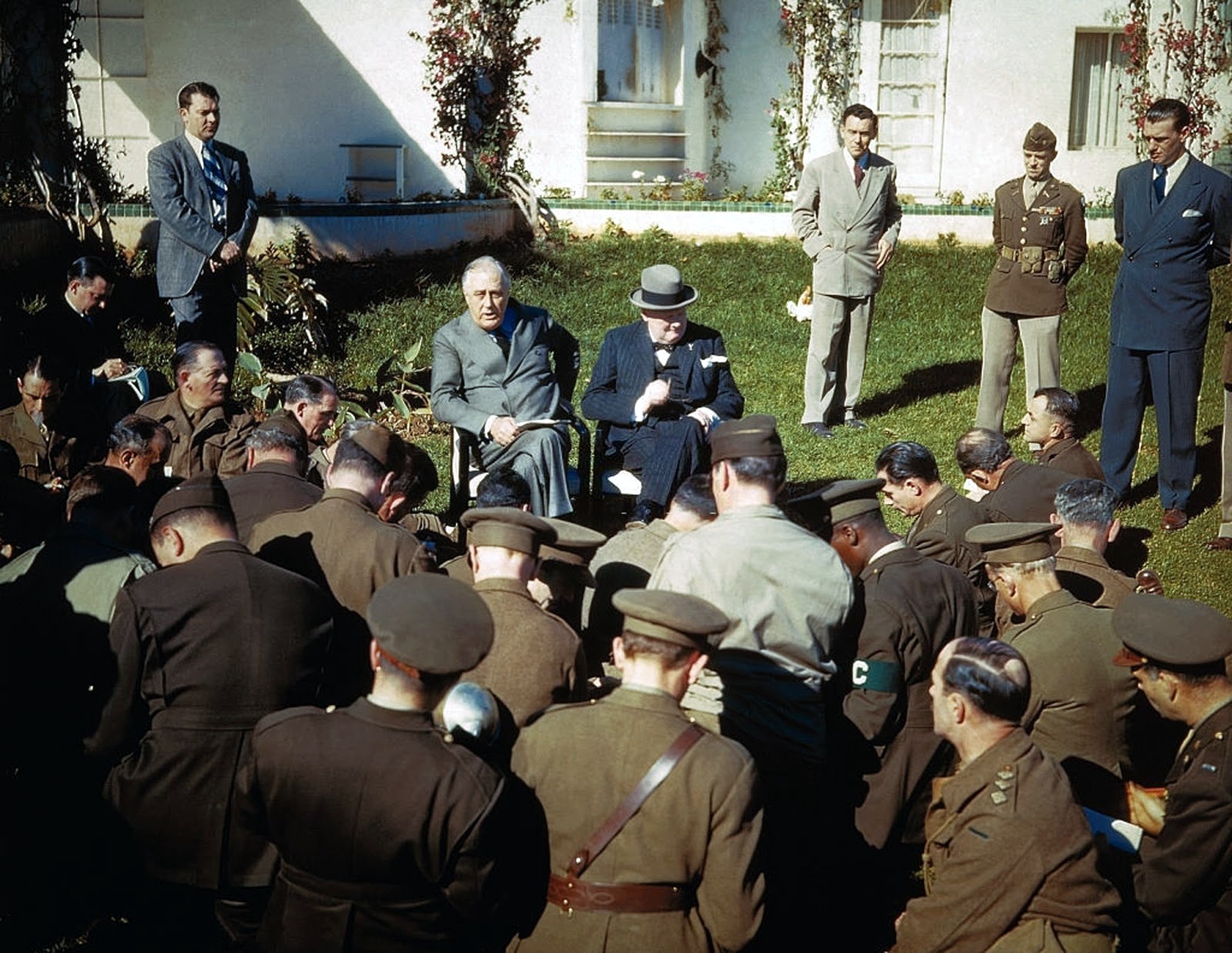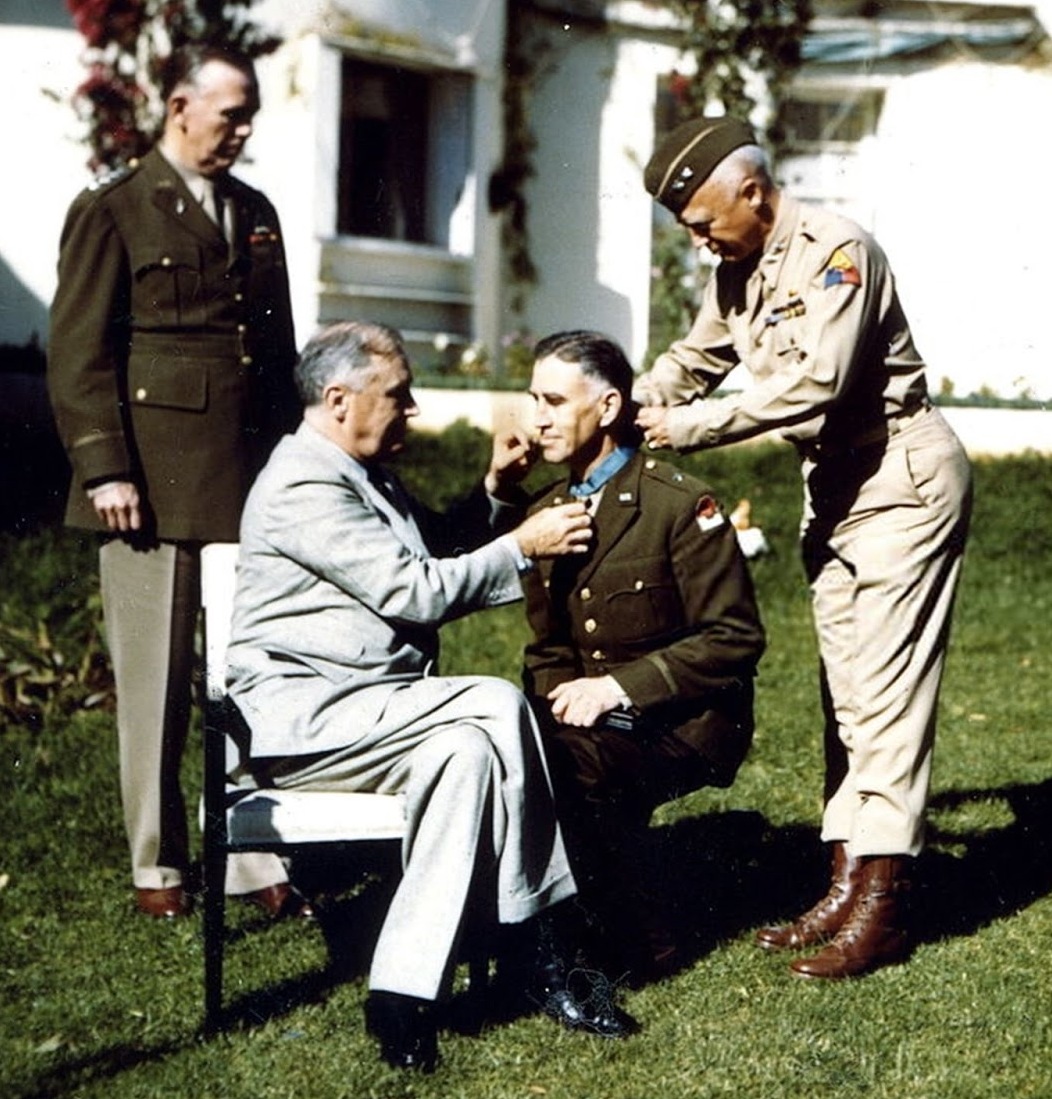Gorrell, UP man, awarded medal by Roosevelt
…
Roosevelt to receive plan to create agency for domestic problems
…
I doubt that is going to happen. Even when WW1 ended there were wars that were still going on or were a by-product of it. So i don’t expect the same when ww2 ends
Völkischer Beobachter (February 1, 1943)
dnb. Genf, 31. Jänner –
Charakteristisch für den Ausgang der De-Gaulle-Giraud-Besprechung ist ein Bericht des News Chronicle über die Rückkehr de Gaulles nach London. Er habe bei seinem Eintreffen auf dem englischen Flugplatz, so schreibt das Blatt, „einen müden und nicht besonders freudig gestimmten Eindruck" gemacht.
So gut sich auch de Gaulle und Roosevelt anläßlich ihres Zusammenseins in Casablanca verstanden hätten, so gingen doch, schreibt News Chronicle, ihre Ansichten über die Gestaltung der Dinge in Nordafrika größtenteils auseinander. Auch die Gespräche de Gaulles mit Giraud hätten zu keiner Einigung geführt. De Gaulle habe deshalb keinen der ihm gemachten Verständigungs Vorschläge annehmen können.
Der Franzose d’Astier de La Vigerie, ein Bruder des bekannten Vertrauensmannes von de Gaulle, wird einer Meldung des News Chronicle-Korrespondenten in Nordafrika zufolge unter der Anklage, an dem Mord an Darlan beteiligt zu sein, vor ein Kriegsgericht gestellt. Diese Meldung wird von Nya Dagligt Allehanda wiedergegeben. D’Astier de La Vigerie wäre ein enger Freund des Mörders Darlans und habe mit diesem noch ein paar Stunden vor dem Mord gesprochen. Giraud habe d’Astier de La Vigerie als einen Verschwörer verhaften lassen.
La Stampa (February 1, 1943)
Vittoriosi combattimenti nella Tripolitania occidentale e in Tunisia – Bona e La Valletta bombardate dagli aerei – Sommergibile avversario affondato
Il Quartiere Generale delle Forze Armate ha diramato nel pomeriggio di ieri il seguente bollettino numero 981:
Forti reparti nemici hanno attaccato, appoggiati da carri armati e da intenso fuoco di artiglieria, nostre posizioni nella Tripolitania occidentale, ma sono stati respinti subendo sensibili perdite in uomini, pezzi controcarro ed automezzi.
Sul fronte tunisino, azioni di gruppi da combattimento dell’Asse hanno avuto favorevole sviluppo; contrattacchi avversari contro le posizioni raggiunte venivano ributtati. La caccia germanica abbatteva otto apparecchi inglesi, uno dei quali facente parte di una formazione che aveva mitragliato una colonna di autoambulanze.
Nostri bombardieri hanno operato su La Valletta e sul porto di Bona; in quest’ultima località, si sviluppavano vasti incendi. Un aeroplano del tipo «Glenn Martin» risulta distrutto da nostri cacciatori nei pressi delle coste tunisine.
Nel tardo pomeriggio di ieri, quadrimotori «Liberator» sorvolavano nuovamente la città di Messina, lanciando bombe dirompenti ed incendiarie. Notevoli i danni; le vittime nelle incursioni della giornata salgono a 51 morti e 105 feriti. La nostra caccia, intercettata la formazione, abbatteva due degli aerei attaccanti. Nello scontro perdeva mo un «Macchi 200», il cui pilota, lanciatosi con il paracadute, atterrava incolume.
Nel Mediterraneo, una torpediniera, comandata dal tenente di vascello Filippo Ferrari-Aggrande, ha affondato un sommergibile nemico.
Nella notte sul 30, un nostro sommergibile operante sulle coste algerine, al comando del tenente di vascello Vittorio Patrelli Campagnano, ha attaccato un grosso convoglio nemico fortemente scortato, in navigazione verso levante, silurando a distanza ravvicinata due grossi cacciatorpediniere, entrambi affondati, e colpendo inoltre una terza unità imprecisata. Dopo soll sei minuti, il sommergibile ha nuovamente attaccato la formazione, silurando ed affondando una quarta grossa unità. I risultati sono stati controllati a vista dal nostro sommergibile, ohe ha saputo disimpegnarsi senza alcun danno.
Altro sommergibile, al comando del tenente di vascello Alberto Longhi, ha attaccato un convoglio scortato al largo di Bougie, silurando e colpendo non meno di due unità di tipo imprecisato, il cui affondamento non è stato potuto constatare, causa della reazione nemica.
U.S. Navy Department (February 1, 1943)
South Pacific.
On January 28, U.S. troops on Guadalcanal Island killed 62 Japanese and took 22 prisoners.
On January 29:
During the early afternoon, a force of Marauder medium bomb (Martin B-26) attacked enemy positions on Kolombangara Island.
During the evening, Marauders bombed the enemy-held area at Munda on New Georgia Island.
Japanese planes bombed U.S. positions on Guadalcanal Island. One enemy plane was shot down.
On January 30, during the morning, a force of Marauder medium bombers, with Airacobra escort (Bell P-39), bombed enemy positions at Munda on New Georgia Island.
Reading Eagle (February 1, 1943)
Flying Fortresses shoot down 8 Nazi planes, sink large vessel at Bizerte
…
Others damaged in Solomons battle, Nippon says; Navy declines comment
…


President Roosevelt was in a jovial mood as he greeted the press with Prime Minister Winston Churchill on the lawn of the hotel at Casablanca where the leaders held their war strategy conferences. Great informality marked the press meeting with correspondents grouped on the ground around the feet of the President and Churchill. (AP)

President Roosevelt presents the Congressional Medal of Honor, the nation’s highest honor, to Brig. Gen. William H. Wilbur for his part in the landings in French Morocco. Maj. Gen. George S. Patton Jr. (right) assists, while Gen. George C. Marshall, Chief of Staff of the U.S. Army (left) looks on, during the ceremony at Casablanca, French Morocco. (AP)

By Dorothy Thompson
When the President in his press conference at Casablanca announced that the United Nations’ war aim toward the Axis was “unconditional surrender,” he made a reference to Gen. Grant, who, in the American Civil War, had made the same demand on the leaders of the South. Gen. Grant, said the President, was known as “Unconditional Surrender Grant.”
The analogy is thought-provoking. Gen. Grant was fighting a civil war – not an international war. The issue in that war was the right of the Southern states to secede from the American Union. Slavery was a secondary issue. The basic principle involved was the authority of the Constitution throughout all the states of America. Before Gen. Lee was called on to surrender, the Emancipation Proclamation had already freed the slaves.
There could be not the slightest doubt, on the part of the leaders of the South, as to the exact meaning of “unconditional surrender.” It means that the South rejoin the Union and submit to its Constitution and its laws. It meant that the Southern Confederacy be dissolved, and its parts reintegrated into the United States of America.
Therefore, Gen. Lee knew what he was doing when he surrendered “unconditionally.” Actually, it was not, in essence, an unconditional surrender, for if the conditions were not to be negotiated, the principles governing those conditions were clear.
If one were to pursue this analogy to its logical conclusion, “unconditional surrender” would mean that the nations of the Axis would have to abandon their attempt to secede from the principles of civilization governing the rest of the world, and join the United Nations, for a world governed by law.
But one cannot pursue this analogy to such a logical conclusion because there is no world governed by law, and there never has been. Nations are still considered as sovereign bodies, what has been called “international law” is merely agreements or treaties amongst sovereign nations which can be unilaterally denounced, broken, or changed: no force exists, or has ever existed, to create, supervise or enforce any law above nations. And there is no indication in any official utterances of the President or Mr. Churchill that we intend to create such supranational institutions. “Unconditional surrender” in this case, therefore, means surrender without condition of some nations to other nations – not surrender to a Constitution.
There are two factors in such a demand. There is the party upon which it is made and there is the party that makes it.
The demand is made upon the governments and peoples of the Axis. Since unconditional surrender means, according to statements which are official, that the present government of Germany will be displaced and that its members will be tried as war criminals, “unconditional surrender” means for them, suicide. The terms are, therefore, impossible of acceptance for the present governments.
But the terms also seem to rule out any possibility of a palace revolution in Germany, at least. Mr. Churchill has apparently modified the terms for Italy, for he has said:
One man, and one man alone, stands in the way of peace.
But any group of Germans, realizing the disaster to Germany, and planning to overthrow the Nazi regime – should such a group exist – will hardly, under these conditions, undertake such a risk and responsibility. A revolution which comes into power only to give away its power the next moment, in an unconditional surrender to other outside powers, does not make sense.
But there is another factor to be considered. Stalin has not demanded “unconditional surrender.” Had he done so, the demand would have had a definite meaning for one group of Germans – namely, the German communists. In their minds, the analogy approximates that of the American Civil War. In the minds of German communists, “unconditional surrender” means the total defeat of fascism, the beginning of the social revolution, and the opportunity to join the Soviet Union, as an integral and equal part of it.
But there is nothing to indicate that “unconditional surrender” to the Western powers means the integration of a democratic Germany, as an equal member of the democratic world.
The demand for “unconditional surrender” imposes a supreme obligation upon those who make it. We are asking the German nation and people to deliver themselves unconditionally into our hands. To consent to that means to divest themselves of all responsibility upon us. The question for us is, therefore: Are we prepared for this responsibility? Do we know what we intend to so with an unconditionally-surrendered Germany?
And who is “we”? The President? The State Department? Mr. Churchill?
Again, I say that we had better get some principles for the reconstruction of Europe, and get them quick. For unconditional surrender, under these conditions, can only come as unconditional breakdown. And, unless there are some principles to fill a vacuum, chaos will fill it.